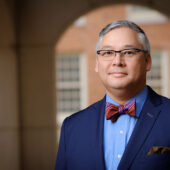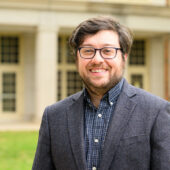Unpacking gun culture in America
 Professor of Sociology David Yamane, an internationally recognized authority on gun ownership in the U.S., offers insights about the nearly 100M American civilians who own firearms.
Professor of Sociology David Yamane, an internationally recognized authority on gun ownership in the U.S., offers insights about the nearly 100M American civilians who own firearms. Categories: Experts, Research & Discovery

 Multitasking is the act of performing multiple tasks or activities simultaneously or near-simultaneously. However, studies in cognitive psychology suggest that true simultaneous multitasking is unlikely. Instead, our brains are switching between tasks. And it has a cost.
Multitasking is the act of performing multiple tasks or activities simultaneously or near-simultaneously. However, studies in cognitive psychology suggest that true simultaneous multitasking is unlikely. Instead, our brains are switching between tasks. And it has a cost. Extroverts were more likely than introverts to feel a strong sense of belonging in their college, an important indicator of whether a student succeeds – or goes home, according to a new study by psychology professor Shannon Brady.
Extroverts were more likely than introverts to feel a strong sense of belonging in their college, an important indicator of whether a student succeeds – or goes home, according to a new study by psychology professor Shannon Brady. In an extensive clinical study, Wake Forest University researchers will determine whether the most common treatments for osteoarthritis also help prevent women from developing the degenerative joint disease.
In an extensive clinical study, Wake Forest University researchers will determine whether the most common treatments for osteoarthritis also help prevent women from developing the degenerative joint disease. Upending the prevailing theory of how and why multi-species mass-migration patterns occur in Serengeti National Park, researchers from Wake Forest University have confirmed that the millions-strong wildebeest population pushes zebra herds along in competition for the most nutrient-dense grasses. The study appears today in the journal Science.
Upending the prevailing theory of how and why multi-species mass-migration patterns occur in Serengeti National Park, researchers from Wake Forest University have confirmed that the millions-strong wildebeest population pushes zebra herds along in competition for the most nutrient-dense grasses. The study appears today in the journal Science.
 In a significant step toward developing new treatments to mend blood vessels damaged by heart attacks and strokes, scientists at Wake Forest University and University of Maryland have discovered how to amplify the effects of an important signaling molecule in the blood. The study published today in the peer-reviewed journal Nature Chemical Biology.
In a significant step toward developing new treatments to mend blood vessels damaged by heart attacks and strokes, scientists at Wake Forest University and University of Maryland have discovered how to amplify the effects of an important signaling molecule in the blood. The study published today in the peer-reviewed journal Nature Chemical Biology. Politics professor Peter Siavelis answers questions about the complicated role the United States played in the 1973 coup in Chile and why democracy should not be taken for granted.
Politics professor Peter Siavelis answers questions about the complicated role the United States played in the 1973 coup in Chile and why democracy should not be taken for granted. Gaming, an $85 billion industry in the U.S. alone, continues to grow in popularity among people of all ages and backgrounds. It's also opening new pathways for listening and increasing audience engagement in symphonic music.
Gaming, an $85 billion industry in the U.S. alone, continues to grow in popularity among people of all ages and backgrounds. It's also opening new pathways for listening and increasing audience engagement in symphonic music. Gold and mineral mining in and near rivers across the tropics is degrading waterways in 49 countries, according to a new study by a team of researchers including WFU biologists and computer scientists.
Gold and mineral mining in and near rivers across the tropics is degrading waterways in 49 countries, according to a new study by a team of researchers including WFU biologists and computer scientists.